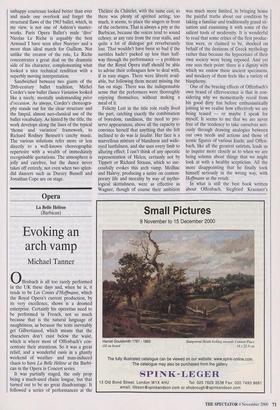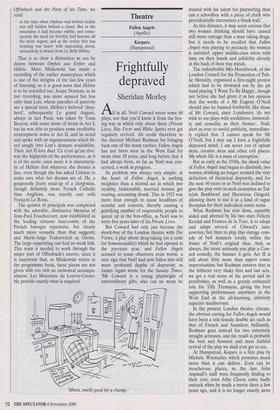Opera
La Belle Helene
(Barbican)
Evoking an arch vamp
Michael Tanner
Offenbach is all too rarely performed in the UK these days and, when he is, it tends to be Les Contes d'Hoffmann, which the Royal Opera's current production, by its very excellence, shows is a doomed enterprise. Certainly his operettas need to be performed in French, not so much because that is the natural language of naughtiness, as because the texts inevitably get Gilbertianed, which means that the characters don't exist below the waist, which is where most of Offenbach's con- centrate their attentions. So it was a great relief, and a wonderful oasis in a ghastly weekend of weather- and man-induced chaos to have La Belle Helene at the Barbi- can in the Opera in Concert series.
It was partially staged, the only prop being a much-used chaise longue, but that turned out to be no great disadvantage. It followed a series of performances at the Theatre du Chatelet, with the same cast, so there was plenty of spirited acting; too much, it seems, to place the singers in front of the orchestra. That is always a pity at the Barbican, because the voices tend to sound echoey, at any rate from the rear stalls, and quite a lot of dialogue got reverberantly lost. That wouldn't have been so bad if the surtitles hadn't packed up less than half- way through the performance — a problem that the Royal Opera staff should be able to advise their colleagues how to deal with, if in easy stages. There were libretti avail- able, but following them meant missing the fun on stage. There was the indispensable sense that the performers were thoroughly enjoying themselves, without making a meal of it.
Felicity Lott in the title role really lived the part, catching exactly the combination of boredom, randiness, the need to pre- serve appearances, above all the capacity to convince herself that anything that she felt inclined to do was la fatalite. Her face is a marvellous mixture of blandness and wide- eyed lustfulness, and she uses every limb to alluring effect; I can't think of any operatic representation of Helen, certainly not by Tippett or Richard Strauss, which so suc- cessfully evokes this arch vamp. Meilhac and Halevy, producing a satire on contem- porary life and morality by way of mytho- logical skittishness, were as effective as Wagner, though of course their ambition was much more limited, in bringing home the painful truths about our condition by taking a familiar and traditionally grand sit- uation and examining it with some of the salient tools of modernity. It is wonderful to read that some critics of the first produc- tion were, or claimed to be, shocked on behalf of the denizens of Greek mythology rather than because the hypocrisies of their own society were being exposed. And yet one sees their point: there is a dignity with which we endow these ancient specimens, and mockery of them feels like a variety of blasphemy.
One of the bracing effects of Offenbach's own brand of effervescence is that in con- sidering why we momentarily recoil from his good dirty fun before enthusiastically joining in we realise how effectively we are being teased — or maybe I speak for myself. It seems to me that we are never free of the tendency to take ourselves seri- ously through drawing analogies between our own needs and actions and those of iconic figures of various kinds; and Offen- bach, like all the greatest satirists, leads us to inquire more closely as to when we are being solemn about things that we might look at with a healthy scepticism. All the more disappointing that he finally took himself seriously in the wrong way, with Hoffmann as the result.
In what is still the best book written about Offenbach, Siegfried Kracauer's Offenbach and the Paris of his Time, we read: at the time when Orpheus was written reality was still hidden behind a cloud. But in the meantime it had become visible, and conse- quently the need for frivolity had become all the more urgent; and as the reality that was looming was heavy with impending doom, melancholy is absent from La Belle HElene.
That is as clear a distinction as can be drawn between Orphee aux Enfers and Helene. Marc Minkowski has made a recording of the earlier masterpiece which is one of the delights of the last few years of listening; so it is good news that Helene is to be recorded too. Jessye Norman, in its last recording, was more sensual but less salty than Lott, whose parodies of passivity are a special treat. Helene's beloved 'shep- herd', subsequently Le grand Augure, always in fact Paris, was taken by Yann Beuron, with some sense of strain in Act I; but he was able to produce some creditable stratospheric notes in Act II, and he acted and spoke with an ingenuousness which fit- ted snugly into Lott's demure availability. Their Act II love duet `Ce n'est qu'un reve' was the highpoint of the performance, as it is of the score; once more it is characteris- tic of Helene that whatever she dreams is fine, even though she has asked Calchas to make sure what her dreams are of. He, a gorgeously fruity send-up of a clergyman, though definitely more French Catholic than Anglican, was starrily cast with Francois Le Roux.
The quintet of principals was completed with the adorable, diminutive Menelas of Jean-Paul Fouchecourt, now established as the leading virtuoso haut-contre of the French baroque repertoire, but clearly much more versatile than that suggests; and Marie-Ange Todorovitch as Oreste. The large supporting cast had no weak link. This team is needed to work through the major part of Offenbach's oeuvre, since it is important that, as Minkowski writes in the programme book, these pieces are not given with too rich an orchestral accompa- niment. Les Musiciens du Louvre-Greno- ble provide exactly what is required.



























































































 Previous page
Previous page